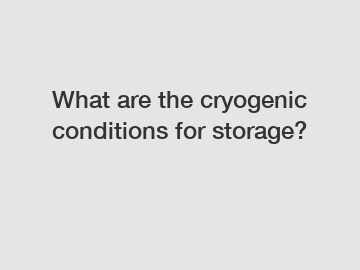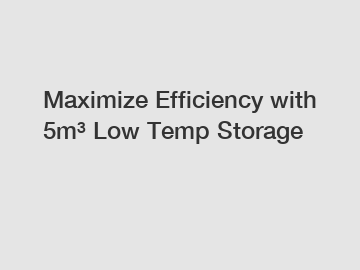What are the cryogenic conditions for storage?
What are the Cryogenic Conditions for Storage?
Cryogenic conditions refer to extremely low temperatures, typically below -130 degrees Celsius (-202 degrees Fahrenheit), at which various materials can be stored without degradation or damage. Cryogenic storage is widely used in different industries such as medical, scientific research, aerospace, and energy. This article will explore the cryogenic conditions required for storage and their significance in preserving the integrity of a wide range of materials.
Cryogenic storage involves the use of specialized containers and equipment to maintain extremely low temperatures. The primary purpose of cryogenic storage is to ensure the long-term preservation of samples, materials, and products in a stable and unaltered state. The low temperatures slow down chemical reactions and biological processes, minimizing the degradation of materials and extending their shelf life.

Understanding Cryogenic Temperatures.
Cryogenic temperatures are achieved using liquid nitrogen (LN2) or liquid helium (LHe) as the cooling medium. Liquid nitrogen boils at -196 degrees Celsius (-321 degrees Fahrenheit) and is commonly used due to its low cost and availability. Liquid helium, on the other hand, boils at an even lower temperature of -269 degrees Celsius (-452 degrees Fahrenheit), making it suitable for ultra-low temperature applications. The choice between liquid nitrogen and liquid helium depends on the specific requirements of the material being stored and the desired level of temperature control.
Secondary Heading: Cryogenic Containers.
Cryogenic containers are essential for storing materials at cryogenic temperatures. These containers are designed to provide excellent thermal insulation to prevent heat transfer from the surroundings. The two most common types of cryogenic containers are Dewars and cryogenic freezers.
Dewars are vacuum-sealed containers with multiple layers of insulation to reduce heat flow. They are often used to store samples in a liquid nitrogen bath or for short-term storage. Cryogenic freezers, on the other hand, are specially designed refrigeration units that maintain a consistent cryogenic temperature. These freezers offer more precise temperature control and are ideal for long-term storage.
Additional resources:Ultimate Guide to Double Ram BOP Technology
Is the tri lateral head unit for sale worth the investment in the purchase stage?
Which is the best grinder machine?
Essential Oil Refinery Equipment: A Complete Guide
What is the cost of small paper bag making machine?
What is the introduction of ozone water treatment?
Are Light Rims Spinning Machines Worth it?
Secondary Heading: Materials Suitable for Cryogenic Storage.
Cryogenic storage can be used for a wide range of materials, including biological samples, chemicals, pharmaceuticals, and electronic components. These materials benefit from cryogenic conditions as it significantly slows down or halts chemical reactions, enzymatic degradation, and bacterial growth. This preservation technique is particularly vital for biological samples such as cells, tissues, and genetic material, which can be damaged or denatured at higher temperatures.
Secondary Heading: Significance of Cryogenic Conditions in Storage.
The use of cryogenic conditions for storage has numerous advantages. Firstly, it allows for long-term preservation, ensuring that samples and materials remain unaltered for an extended period. Secondly, cryogenic storage minimizes the need for frequent transfers or transportation, reducing the risk of damage and contamination. Additionally, cryogenically stored materials can be easily retrieved for research, analysis, or production purposes.
Closing paragraph:
In conclusion, cryogenic conditions provide an effective and reliable method of storage for a wide range of materials. Whether it is biological samples, chemicals, or electronic components, cryogenic storage ensures their long-term preservation and stability. If you require cryogenic storage services or have any questions regarding cryogenic conditions, please feel free to contact us.
Keywords: contact us.
If you want to learn more, please visit our website Argon Dewar Tank, Vertical Low-Temperature Storage Tank, Liquid Natural Gas Micro Bulk Tank.
Additional resources:Why is thickness important in PCB?
How much does the EMF test cost?
Are Hydraulic Mini Excavator Pumps Worth Upgrading?
How many tons can you haul on a single axle dump truck?
What is the price of small cardboard paper making machine?
Everything You Need to Know About Hotmelt Glue Dispensing Machines
Exploring the Benefits of Single Ram BOP
206
0
0
Related Articles
-
211
0
0
-
208
0
0
-
203
0
0
-
210
0
0
-
175
0
0
-
190
0
0
-
187
0
0
-
183
0
0









Comments
All Comments (0)